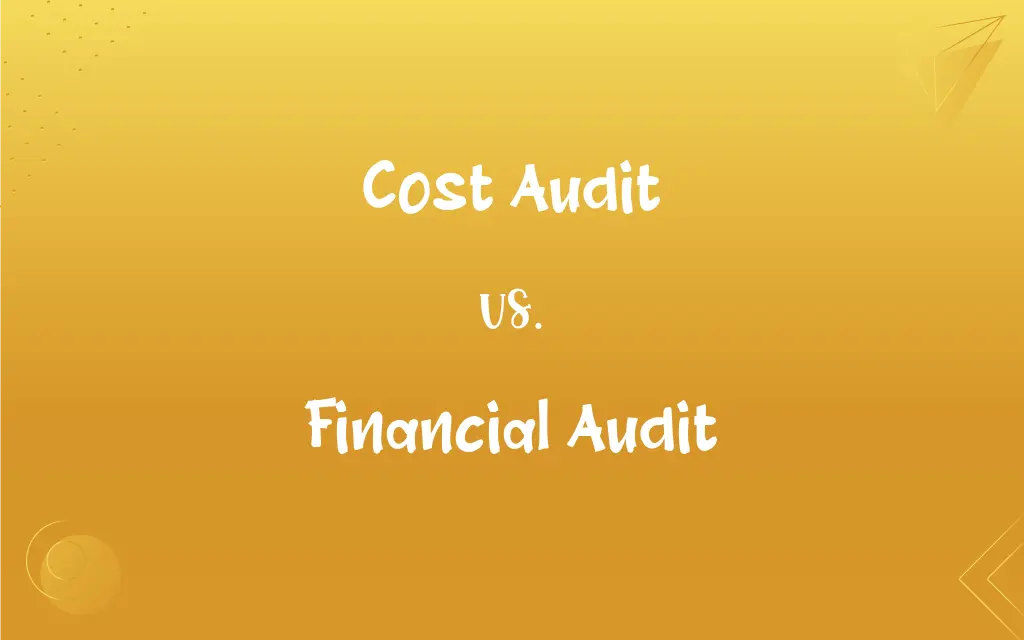Cost Audit vs. Financial Audit: What's the Difference?
Edited by Harlon Moss || By Janet White || Published on November 23, 2023
Cost Audit reviews the accuracy of cost records, while Financial Audit examines an organization's financial statements' accuracy and fairness.

Key Differences
A Cost Audit primarily focuses on the verification of the cost of production or cost of operations reported by a company. This audit ensures that the cost accounting records are accurately maintained. On the other hand, a Financial Audit concentrates on the validation of an organization's financial statements, ensuring they are presented fairly and in accordance with accounting standards.
While a Cost Audit aims to ascertain the accuracy of cost structures and ascertain wastage or inefficiencies, a Financial Audit seeks to provide assurance that an organization's financial statements are free from material misstatements, be it due to fraud or error.
The primary audience for a Cost Audit could be the company's management, seeking to identify inefficiencies or areas for cost optimization. A Financial Audit, however, is conducted for stakeholders, investors, creditors, or regulatory bodies to rely upon when making financial decisions.
Cost Audits require an in-depth understanding of the company's production processes, costing methods, and overhead allocation. In contrast, Financial Audits necessitate a broader view, focusing on items like revenue recognition, asset valuation, liabilities, and equity.
It's also worth noting that while Cost Audits are often industry-specific and may not apply to every organization, Financial Audits are applicable across various industries and are often mandated by laws and regulations.
ADVERTISEMENT
Comparison Chart
Main Focus
Verification of cost records
Examination of financial statements
Objective
Ascertain accuracy of cost structures
Ensure statements are free from misstatements
Primary Audience
Company's management
Stakeholders, investors, regulatory bodies
Required Knowledge
Production processes, costing methods
Accounting standards, revenue recognition
Applicability
Often industry-specific
Broadly applicable, often mandated
ADVERTISEMENT
Cost Audit and Financial Audit Definitions
Cost Audit
An examination of the efficiency of cost control measures in place.
The Cost Audit revealed areas where the firm could optimize its manufacturing processes.
Financial Audit
A systematic review to ascertain if financial transactions are properly documented and reported.
The discrepancies identified during the Financial Audit raised concerns about the company's internal controls.
Cost Audit
An audit focused on ensuring that costs are recorded in compliance with relevant standards.
The regulatory body mandated a Cost Audit to ensure adherence to the costing standards.
Financial Audit
An examination of an organization's financial statements to ensure their accuracy and fairness.
The annual Financial Audit gave the shareholders confidence in the company's financial health.
Cost Audit
A systematic review and verification of cost accounts and records.
The company initiated a Cost Audit to ensure that production costs were accurately reported.
Financial Audit
A process ensuring that financial statements comply with relevant accounting standards.
The Financial Audit concluded that the company's statements were in line with GAAP.
Cost Audit
A procedure to verify the correctness of cost allocations.
A third-party was hired to conduct a Cost Audit and validate the cost allocations to various departments.
Financial Audit
An independent evaluation of financial records for the detection of fraud or error.
The unexpected results of the Financial Audit led to a deeper investigation into potential fraudulent activities.
Cost Audit
A review aiming to identify and rectify any wastage or inefficiencies in the costing process.
The findings of the Cost Audit led to significant changes in the supply chain management.
Financial Audit
An audit aimed at providing assurance to stakeholders regarding the authenticity of financial data.
Before making their investment, the venture capitalists requested a thorough Financial Audit.
FAQs
Is a Financial Audit mandatory for all businesses?
Often, a Financial Audit is mandated by laws, especially for publicly-traded companies or based on size criteria.
What's the core purpose of a Cost Audit?
A Cost Audit verifies the accuracy of cost records and identifies cost optimization areas.
Who typically conducts a Cost Audit?
A specialized cost accountant or cost auditor typically conducts a Cost Audit.
Can a Cost Audit suggest areas of cost reduction?
Yes, a Cost Audit can highlight inefficiencies and suggest areas for cost reduction.
Why is a Financial Audit crucial for investors?
A Financial Audit provides investors assurance on the accuracy and fairness of a company's financial statements.
What's the outcome of a Financial Audit?
The outcome of a Financial Audit is an audit report, expressing an opinion on the financial statements' accuracy.
About Author
Written by
Janet WhiteJanet White has been an esteemed writer and blogger for Difference Wiki. Holding a Master's degree in Science and Medical Journalism from the prestigious Boston University, she has consistently demonstrated her expertise and passion for her field. When she's not immersed in her work, Janet relishes her time exercising, delving into a good book, and cherishing moments with friends and family.
Edited by
Harlon MossHarlon is a seasoned quality moderator and accomplished content writer for Difference Wiki. An alumnus of the prestigious University of California, he earned his degree in Computer Science. Leveraging his academic background, Harlon brings a meticulous and informed perspective to his work, ensuring content accuracy and excellence.































































